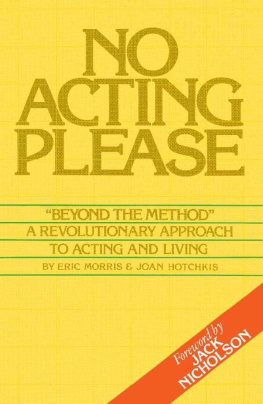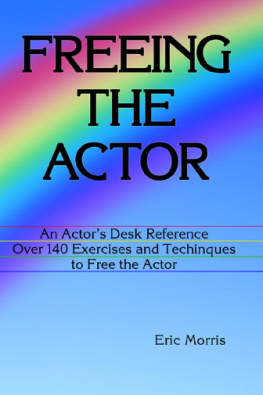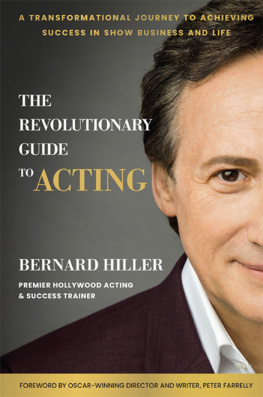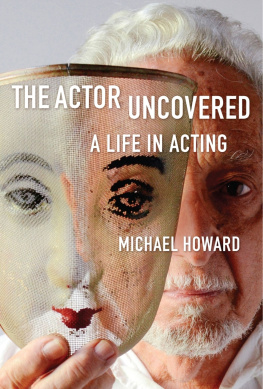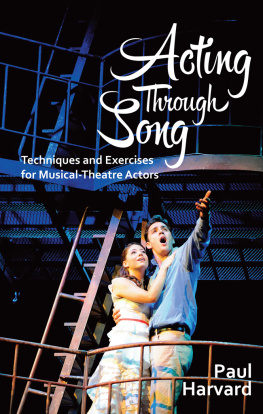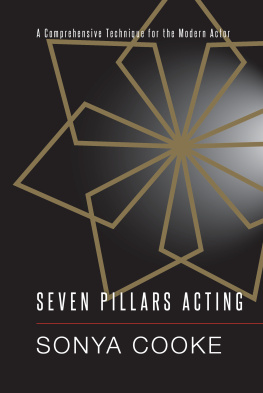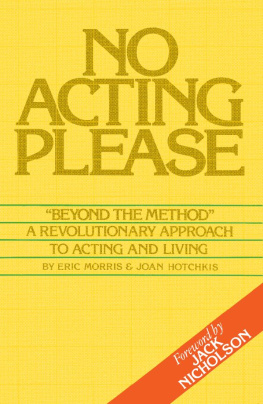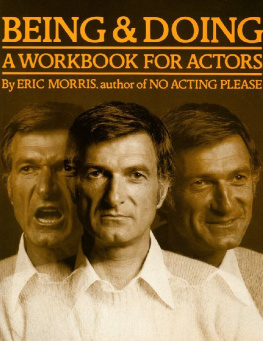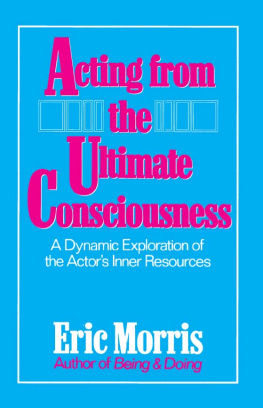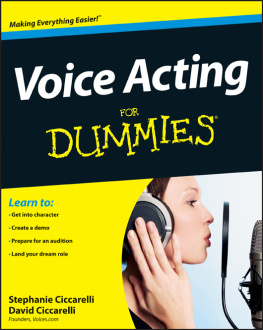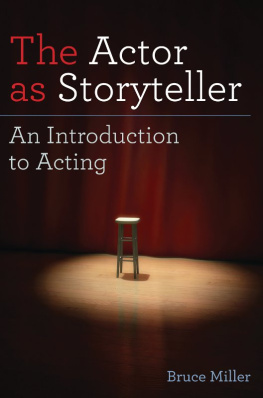
NO ACTING
PLEASE
ERIC MORRIS AND JOAN HOTCHKIS
Ermor Enterprises
Publishing
Copyright 1977, 1979, 1995, 1998, 2002, by Eric Morris and Joan Hotchkis
All rights reserved.
Printed in the United States of America.
No part of this book may be reproduced or transmitted in any form or by any means, electronic or mechanical, including photocopying, without permission in writing from the publisher: Ermor Enterprises Publications 8004 Fareholm Drive, Los Angeles. California 90046
International Standard Book Number: 0-9629709-3-X Library of Congress Catalog Number: 78-68478
Designed by Ede Dreikurs
Distributed by S.C.B.(800-729-6423)
ACKNOWLEDGMENTS
With gratitude to Daniel Spelling for the tireless efforts put forth in editing the text. For him it was truly a labor of love.
And to Paul Whitehouse for his insight and encouragement in the publication of No Acting Please.
And to all the actors who were instrumental in the evolvement of the techniques herein.
Eric Morris
Joan Hotchkis
Also by Eric Morris
Irreverent Acting
Being and Doing
Acting from the Ultimate Consciousness
Acting, Imaging and the Unconscious
Coming soon: The Diary of a Professional Experiencer
Audio Tapes
The Craft of Acting
The Megapproaches
Imaging for Acting
For further information on Eric Morris,
his work, the books and audio tapes visit
our web site: www.ericmorris.com
The Eric Morris Actors Workshop is located at:
5657 Wilshire Blvd. Suite 110, Los Angeles, CA 90036
(323) 466-9250
If you find the information in this book valuable, youll be interested to know that cassette tapes by Eric Morris are now available. These 60- to 90-minute audio tapes were recorded live at actual workshops and seminars conducted by Mr. Morris and are ideal for use in conjunction with all his books. The tapes are offered in a series covering the entire system of work, but each separate tape is a complete and exciting learning tool by itself.
To receive the first tape plus a full information brochure, send your check for $9.95 plus $1.00 for postage and handling to:
Ermor Enterprises
8004 Fareholm Drive
Los Angeles, California 90046
Money refunded if not satisfied.
FOREWORD
Eric and I met as students in the sense memory class he describes in this book. No one was more zealous in pursuit of the work than the manic-depressive dane. Nothing daunted Morris. Not the actress who really fainted in Dark of the Moon; not the actor who wore rubber bands and couldnt figure out from which side of his mouth to spit his Ludens cough drops; not me as the nazi of your dreams driving him quivering and vulnerable through the concentration camp of his; not even being called the most pretentious ass this side of Sasha Guitry at four a.m. by some angry young actor with Gallo on his lips. Eric was always helpful to others, and most important to himself.
The reality is no one can tell you how to act. My own feelings and observations tell me it requires deep personal commitment to allow any individual to move from that vague desirous state of Im gonna be an actress (or actor) to a point where the actor has some vague sense that every part in which he is cast is not some incredible piece of luck like saying the secret word on You Bet Your Life, but the result of some solidly acquired skills which, in there, where the truth is, he can call his own.
No book is going to contain all of the things which have helped other actors arrive at a free use of their talent.
As is pointed out in this book, many people feel any academic approach to acting is in conflict with the Gypsy, or intuitive element of this craft. I suppose the reason Eric asked me to write something for the front of this book is because we have been in many classes, workshops, groups, whatever, together where we observed an experienced talent struggling for agonizing, tedious, and hysterical periods of time to break through and become expressive. If youre interested in this sort of thing, it can be an inspiring process. Its not for everyone. Its not entertaining. though it can be. There are no guarantees or diplomas, but it can be deeply satisfying to acquire and be a part of anothers acquisition of the tool which allow them to enjoy and express their talent.
The concept of Being as opposed to Acting is Erics focus here. Along the way he describes exercises related to actors adversary number one. Tension; relating, stimuli, levels of consciousness, behavior, vulnerability, unpredictability, specificity, and many others. What is described has worked in some way for one actor or another. The Method is, If it works, use it.
Jack Nicholson
CONTENTS

Chapter
BEING
ON BEING
Acting is the art of creating genuine realities on a stage. No matter what the material, the actors fundamental question is: What is the reality and how can I make it real to me ?In this kind of training the actor discovers himself fully both on the stage and off, since the exercises in this book repeatedly demand an integration of living and acting. It is a way of life, not just a way of work.
For the first few years I taught acting to the letter. I was faithful to the Stanislavsky-derived techniques I had learned and my approach to creating realities on the stage encompassed sense memory, affective memory, task choices, etc. Over this period I became increasingly aware that some actors could use the work quite well and other actors, also talented, couldnt make it happen. It didnt work for them. Even for the actors who did well, there remained huge areas unreachable to them and their work often seemed clinical and academic. I became frustrated. I began to doubt The Method as a total approach, began to believe the pessimistic sayings of the master acting teachers, that only two percent of actors could use The Method. And even in my own work as an actor I was frustrated, disappointed in the results I was getting. It was about this time that I started asking some questions, such as how can the same technique work for everybody. Not everybody is the same. We all have different fears, different inhibitions, a variety of different concerns and certainly different backgrounds. Why are actors afraid to talk about themselves personally? Why do acting teachers shy away from discussing the personal elements in acting? Why is everybody so secretive?
I came to the realization that while theres lip service paid to using your personal life on stage and getting deep into your own emotions, few actors have the courage to do this and most teachers arent even aware of the necessity for this kind of search. You cant teach a man to run if he hasnt got legs. Nor can you teach a person to act if he isnt connected to his inner self. I started to develop an approach to acting which embarked on a search of the self and led toward usage of the self on stage. Out of this approach came a whole system of work which included some of the skills of The Method, but these skills now became really applicable because they were emanating from a really personal nucleus. I discovered that one of the reasons why many actors couldnt use the Stanislavsky system was because of the separation between technique and personal reality. How can a system designed to be personal work for actors who are not personal and dont even know what they feel?
I invented exercises which required that actors search for their own personal points of view about everything and express it. Hundreds of exercises evolved out of working with actors who were struggling with individual problems. Some of these exercises are named after the actors they were first designed for, although later, of course, they applied to other actors. The Rounds were born. I demanded that actors encounter each other in Reluctancy Exercises, in Honesty Stream of Consciousness, in Ego Reconstructions and other Round Exercises. (Well describe all of these later.) I encouraged them to be extremely personal with each other, to do away with their social impositional life and to experience the real moment no matter what the imagined consequences.
Next page
